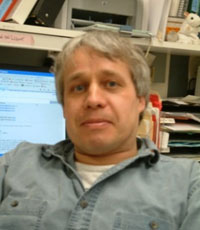A B C D E F G H I J K L M N O P Q R S T U V W X Y Z |
| Endocrinology and Metabolism |
 STANISLAUS VAN UUM, MD, PhD, FRCPC, Professor STANISLAUS VAN UUM, MD, PhD, FRCPC, Professor
Dr. Stan Van Uum is an Associate Professor in the divisions of Endocrinology & Metabolism and Clinical Pharmacology, Western University, London, Ontario. He completed his undergraduate and graduate training in Internal Medicine in 1997, followed by a Fellowship in Endocrinology and Metabolism (2001), all at the University of Nijmegen in The Netherlands. He then completed his PhD in Medicine on the role of cortisol metabolism in hypertension. Dr. Van Uum is interested in the role of hormones, particularly steroid hormones, in health and disease. These studies include consequences of drug-induced hypogonadism, and the measurement of steroid hormones in hair. His research group now is a global leader in the measurement of steroid hormones in hair. Other studies focus on thyroid cancer and thyroid hormone treatment. His clinical practice is focused on endocrinology, with a particular interest in pituitary, thyroid and adrenal diseases, and secondary hypertension. He is cofounder of the multidisciplinary pituitary team in London, Ontario. Stan Van Uum is actively involved in teaching in relation to these areas, and Program Director for Endocrinology and Metabolism. Keywords: Adrenal Cortisol Hair Pituitary Thyroid cancer |
| Respirology |
 VELDHUIZEN RUUD, PhD, Associate Professor of Medicine, Associate Professor of Physiology & Pharmacology VELDHUIZEN RUUD, PhD, Associate Professor of Medicine, Associate Professor of Physiology & Pharmacology
Ruud Veldhuizen is an Associate Professor in the departments Medicine and Physiology & Pharmacology at the University of Western Ontario, as well as a scientist at the Lawson Health Research Institute. He received his PhD in biochemistry from the University of Western Ontario in 1993 and started as a scientist at the LHRI in 1997 focussing mostly on the role of surfactant in health and disease. The current objective of research in his lab is to understand the mechanisms leading to Acute Lung Injury (ALI) and to develop logical treatment strategy to improve the outcome of patients afflicted with this syndrome. ALI is defined by the inability of the lung facilitating the diffusion of oxygen from the atmosphere into the blood and has a reported incidence of about 70 cases per 100,000 person-years, with a mortality of approx. 40%. The Veldhuizen lab, together with his collaborators Drs Jim Lewis, Cory Yamashita and Fred Possmayer, focus on four aspects of ALI. A first and longstanding interest is the role of the pulmonary surfactant system in ALI. Impairment of the pulmonary surfactant system contributes to the lung dysfunction associated with ALI; novel biophysical approaches such as atomic force microscopy and captive bubble surfactometry are utilized to establish the molecular basis for surfactant dysfunction. The second area of investigation is the role that mechanical ventilation plays in the progression of the disease. To this end animal models are employed to study the impact of various ventilation strategies in the presence and absence of pre-existing lung injury. Based on the fact that in most people the main cause of mortality for patients with ALI is multiple organ failure (MOF), the third area of interest in the Veldhuizen lab is the link between the lung and the development of MOF. Using both in vivo, ex vivo and in vitro methodology, the mechanisms by which lung inflammation can become decompartmentalized and thereby impact other organs is investigated. Finally, the most recent area of research is to study factors that may render patients more susceptible to the development and/or progression of ALI and MOF. Currently, the impact of hypercholesteremia on disease progression is investigated in animal models. Keywords: Acute lung injury Biophysics Cholesterol Gastric Acid Aspiration Inflammation Multi-organ failure Phospholipids Pulmonary Surfactant Respiratory Physiology Sepsis |

